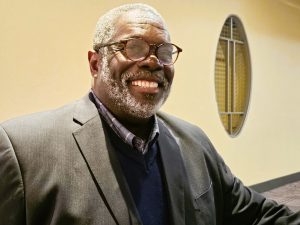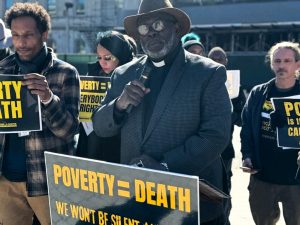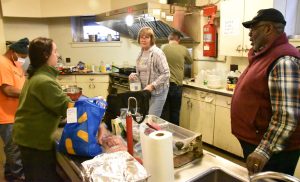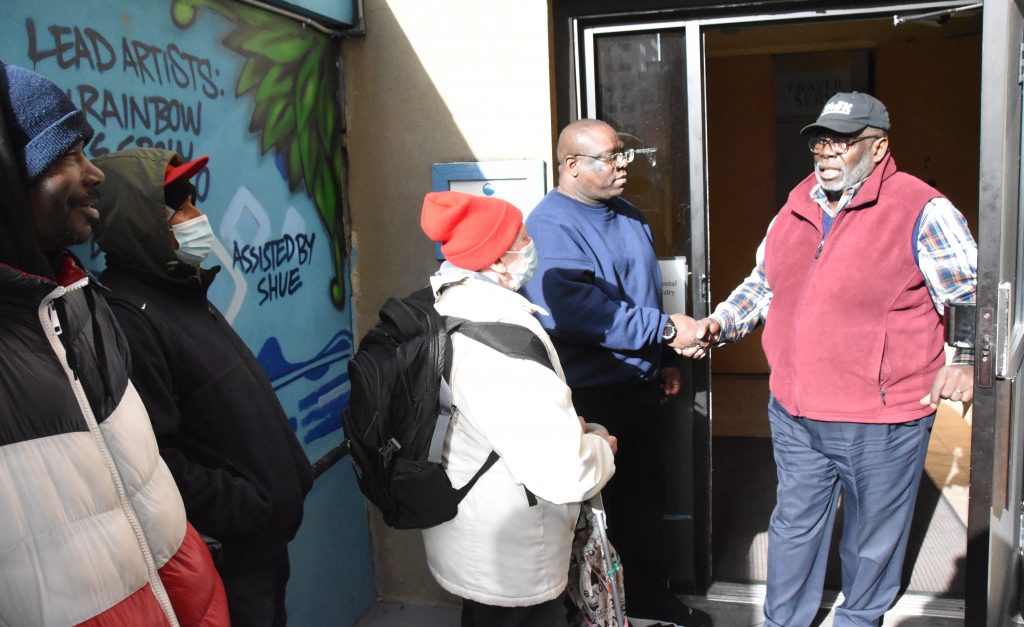As the Rev. Rupert Hall Jr. completes eight years as the pastor of Turning Point United Methodist Church in Trenton, N.J. June 30, he is already writing the next chapter of his own story, one of dedicated service and leadership. “Hope for the City” is the new nonprofit he is creating, a lofty title anchored by the word that is most fundamental to his ministry: “Hope.”
Many clergy this month are remembering influential German theologian Jürgen Moltmann, who died in June at age 98. His iconic 1964 book Theology of Hope called on the church to be God’s constant hope-bearers, representing, in his words, “the realization of righteousness, freedom and humanity in the light of the promised future that is to come.”

The Rev. Rupert Hall Jr.
Likewise for Hall, hope is not a hazy vision of a preferred future but a resilient belief in God’s ultimate promise that is always present and yet emerging—even in the most desperate times.
Like Jesus reported to John the Baptist’s disciples, people who come to Turning Point are receiving what they need each week: food, diapers, liberation from inner chains that bind them, and the chance to hear the good news preached to them. Meanwhile, the people who belong to this historic church are learning to be hope-bearers.
Gale Czyz, a 50-year member, loves her 252-year-old church (est. 1772). A marriage between two United Methodist congregations—First and St. Paul—it is one of New Jersey’s oldest and most beautiful churches, and it benefits from having an interracial membership. Czyz has seen her family grow up and be baptized, confirmed and married there.
She also loves her pastor—an affection shared by other members—and she loves all that he has done since he arrived in 2016 and began growing the church’s ministry footprint through community partnerships. “We helped feed breakfast to 250 people last Saturday and 300 more on Wednesday, plus distributed bags of groceries and about 55 diapers,” Czyz proudly reported at a cookout Hall hosted at his home June 22. “We’re sad that he’s leaving.”
Answering a higher call
The part-time pastor with a deep baritone voice from Pasadena, Md., lives in Mt. Laurel and is a former commercial banker and lawyer, educated at the University of Pennsylvania’s Wharton School of Business and Rutgers University School of Law. He joined Turning Point as a lay member in 2007 and soon became its lay leader. He served alongside retired Bishop Felton May and other pastors, teaching Sunday school and leading other ministries.
Then, answering a higher call, he became a Licensed Local Pastor in 2013 and served at nearby Groveville UMC for three years. When he was asked to return to Turning Point as its pastor, the church was dwindling in money, membership and ministries.
“I told the people, ‘We don’t have a lot of money, but we do have assets,” said Hall, citing the church’s convenient downtown location, building space and parking, plus volunteers willing to address problems plaguing the city.
For eight years, he has made vital connections and led the church to make a difference in its community by collaborating with other churches and nonprofits to cosponsor food pantries, job fairs, educational events and more. He leads a small, busy team of volunteers that he wishes was larger.
 But he has attracted other support from all over. Turning Point has hosted not only food distribution but also concerts, mayoral debates, health education events, creative anti-violence initiatives, and protest rallies to advocate for economic and racial justice. In fact, Hall, who helps lead the New Jersey Poor People’s Campaign with two other co-chairpersons, hosted and spoke at its statewide anti-poverty rally at the church March 2.
But he has attracted other support from all over. Turning Point has hosted not only food distribution but also concerts, mayoral debates, health education events, creative anti-violence initiatives, and protest rallies to advocate for economic and racial justice. In fact, Hall, who helps lead the New Jersey Poor People’s Campaign with two other co-chairpersons, hosted and spoke at its statewide anti-poverty rally at the church March 2.
Having served on the Greater New Jersey Conference’s Board of Trustees and now on its Commission on Archives and History, he also serves and has served as a leader on numerous community boards including:
- the Kingsbury Corporation that manages a 304-unit affordable housing project;
- the Trenton Area Soup Kitchen, which provides a host of self-sufficiency services;
- Mercer Alliance to End Homelessness;
- Mercer Street Friends, which addresses hunger, educational and emotional needs; and
- The Maker’s Place, a diaper bank and family resource center that started at Turning Point and is supported by the Greater New Jersey Conference as a Hope Center.
A relevant church with a heart for the city
 Approximately 200 people come through the church’s doors every week, in addition to a Liberian United Methodist congregation that worships there on Sunday afternoons. “We want the city to know we’re here to contribute to its life,” Hall said. “We’re dedicated to being a relevant church with a heart for the city. It’s all about establishing relationships and doing what Jesus did.
Approximately 200 people come through the church’s doors every week, in addition to a Liberian United Methodist congregation that worships there on Sunday afternoons. “We want the city to know we’re here to contribute to its life,” Hall said. “We’re dedicated to being a relevant church with a heart for the city. It’s all about establishing relationships and doing what Jesus did.
“What people come here for, most of all, is hope,” he said. Yet, the food, diapers, classes, housing and employment assistance, and other basic resources they receive are not enough. What he wants and tries to add to all the charitable efforts is “spiritual guidance and understanding” to foster a deeper, more lasting and reliant hope in the gospel of Jesus Christ.
Hall plans to continue that quest and redirect his work through Hope for the City, a faith-based, grant-funded initiative he is planning that may include organizing self-help groups, training events and other facets to address spiritual, economic and justice concerns. What it will definitely include, however, is hope-bearing partnerships like those he has developed at Turning Point to help serve people’s needs in body and soul.

